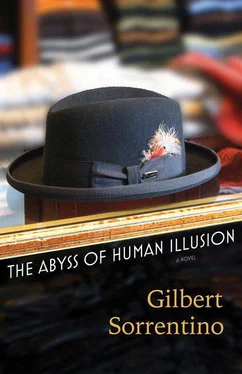Gilbert Sorrentino
The Abyss of Human Illusion
The Abyss of Human Illusion was begun by my father in October 2003, and a first draft was mostly complete when he was diagnosed with cancer in the fall of 2005. Both the disease and its treatment rapidly incapacitated him, and he had little physical or intellectual energy available to sit at his desk and work. Despite this, he did work throughout his final months to complete what he referred to matter-of-factly as “my last book,” finishing it a few weeks before his death in May 2006. At the time, he provided me with a typescript, heavily corrected and with marginal notations, consisting of the main sections of the novel, as well as a composition notebook in which he’d drafted in longhand the brief glosses on these sections, which together comprise the book in its entirety.
In preparing the manuscript for publication, I encountered one immediate problem. As his strength faded, my father’s handwriting (somewhat difficult to read under the best of circumstances) deteriorated to the point of near illegibility. Determining his intentions was made more difficult by his habitually precise, but not necessarily consistent or orthodox, approach to punctuation, typography, and so forth — the minutiae most commonly in question. Less frequently, although more problematically, I came across indecipherable words and phrases. Often these became clear in context, or were repeated elsewhere more legibly, and thus were easily transcribed. In some instances, though, I have taken an educated guess, drawing on my familiarity with my father’s work and verbal mannerisms. I found these to be relatively simple decisions, although doubtless there are some presumptuous flaws in my leaps of conjecture.
My father never made the switch to word processing, and habitually made handwritten revisions and alterations to his work only periodically and at discrete stages in the process — the now-common practice, familiar to writers of my generation, of intermittent, even fitful, revision and the subsequently frequent creation of wholly updated “documents” was unknown to him. In other words, I was working with what amounted to a corrected first draft, and in places the absence of the author from several stages of composition could be felt. While some sections called for only minor modifications — the correction of obvious errors and unintentional inconsistencies, for example — others raised the issue of their suitability for inclusion. In the end, I decided to ready the manuscript in its entirety for publication, for reasons that readers, and certainly writers, may find interesting.
For much of his career, my father delighted in writing within formal constraints (a practice that gave rise to what may be his defining remark, “Form not only determines content, but form invents content.”). Some of the forms he devised allowed tremendous opportunity for play, in other cases the approach demanded a rigorous observance of prescribed rules and procedures. Correspondingly, while sometimes the formal conceits in his novels are obvious or easily grasped (the algorithmic mechanism of Aberration of Starlight; the use of the Tarot deck in Crystal Vision), many of his later books offer a less apparent and/or more indeterminate structure, and it is among this latter group that The Abyss of Human Illusion belongs. Though one aspect of its structure is evident even from a cursory look at the book (Its fifty sections grow incrementally longer; while the first is around 130 words, the last is around 1,300), its other formal ambitions remain unclear (to me).
Add to this the fact that, as is often the case with my father’s work, there is a dense measure of intertextuality present in the book — sections of the book refer, or seem to refer, to one another, to my father’s other books, to episodes depicted in those other books, and to stories and poems by others (Section XVI, for instance, is a loose reinterpretation of Rimbaud’s early poem, “Winter Dream.”). Perhaps not-so-paradoxically, the technical goals my father set only rarely trumped his belief — his faith, even — in serendipity, accident, in the aesthetically justified deviation from constraint that the OuLiPo named the clinamen; in standing back and seeing for himself whether a thing was finished to his satisfaction. Ultimately, the correct artistic balance was something my father determined not by having fully executed a schematic requirement, but, for better or worse, in the scale of his hand.
Accordingly, while I have made surgical excisions and interpolative changes as described above, and while I have, on occasion, cut sentences, phrases, and even paragraphs where it seemed to me that my father abruptly galloped off on one of the well-lathered hobbyhorses he rode over the years, or bore down on something more heavily than I believed his finely calibrated sense of irony and sarcasm would have allowed to stand, I have gone no further in “editing” this book. The scale of my own hand, though competent and discerning, is not that of his, and that alone is enough to stop me. Perhaps in time, when Sorrentino scholarship is not the exclusive pursuit of devoted sons and other deviants, a definitive edition of The Abyss of Human Illusion will appear, and I can only hope that the patient soul who labors over it will find my judgments essentially sound.
None of this is intended to suggest that this is an unfinished volume, intended only for scholars and completists. My father, who never had a problem burying work that dissatisfied him, made quite clear his intention and desire that this book be published. And it should be noted that, despite his absence from his customary role in its preparation, it is, in the end, a book to which he literally brought the fullest measure of his energy and ability.
— Christopher Sorrentino
THE ABYSS OF HUMAN ILLUSION
He sat and stared at the sea, which appeared all surface and twinkle, far shallower than the spirit of man. It was the abyss of human illusion that was the real, the tideless deep.
— HENRY JAMES
Mundane things, pitiful in their mundane assertiveness, their sad isolation. Kraft French dressing, glowing weirdly orange through its glass bottle, a green glass bowl of green salad, a bottle of Worcestershire sauce, its paper wrapper still on. All are in repose, in their absolute thingness, under the overhead alarming bright light of the kitchen. They may or they should, they must, really, reveal the meaning of this silent room, this silent house, save that they won’t. There is no meaning. These things will evoke nothing.
In years to come, almost three-quarters of a century, they still evoke nothing. Orange, green, incandescent glare. Silence and loss. Nothing. There might be a boy of four at the table. He is sitting very straight and is possibly waiting for someone.
“Who knows what evil lurks in the hearts of men?” the Shadow asks, and answers himself, “The Shadow knows.” The Shadow knows everything. “The weed of crime bears bitter fruit. Crime does not pay.” The soft and eerie voice states these opinions as fact. As truth. As the law. Then the Shadow begins to laugh, a terrible, monstrous, haunting laugh, and then steps softly out of the Philco floor-model radio, amazingly and terrifyingly out of the little orangeglowing arc of the dial.
He stands in his black cloak and black slouch hat, his face covered save for his vengeful, burning, hellish-black eyes. The boy turns pale and his heart stops beating for a moment. “The Shadow knows,” the phantom says, and begins, again, mercilessly, his unearthly laughter, laughter that his dead grandmother would laugh, were she able.
Читать дальше












